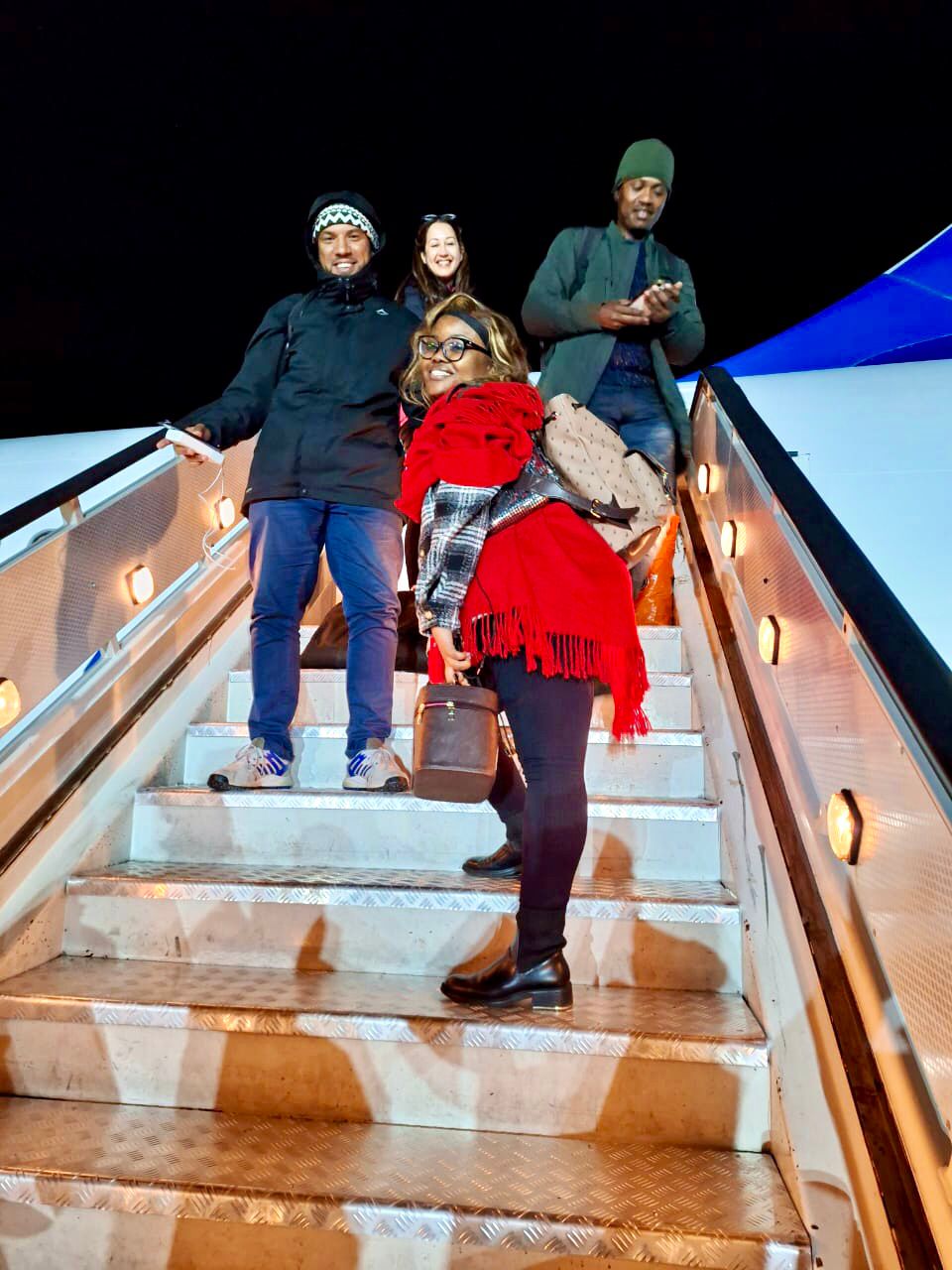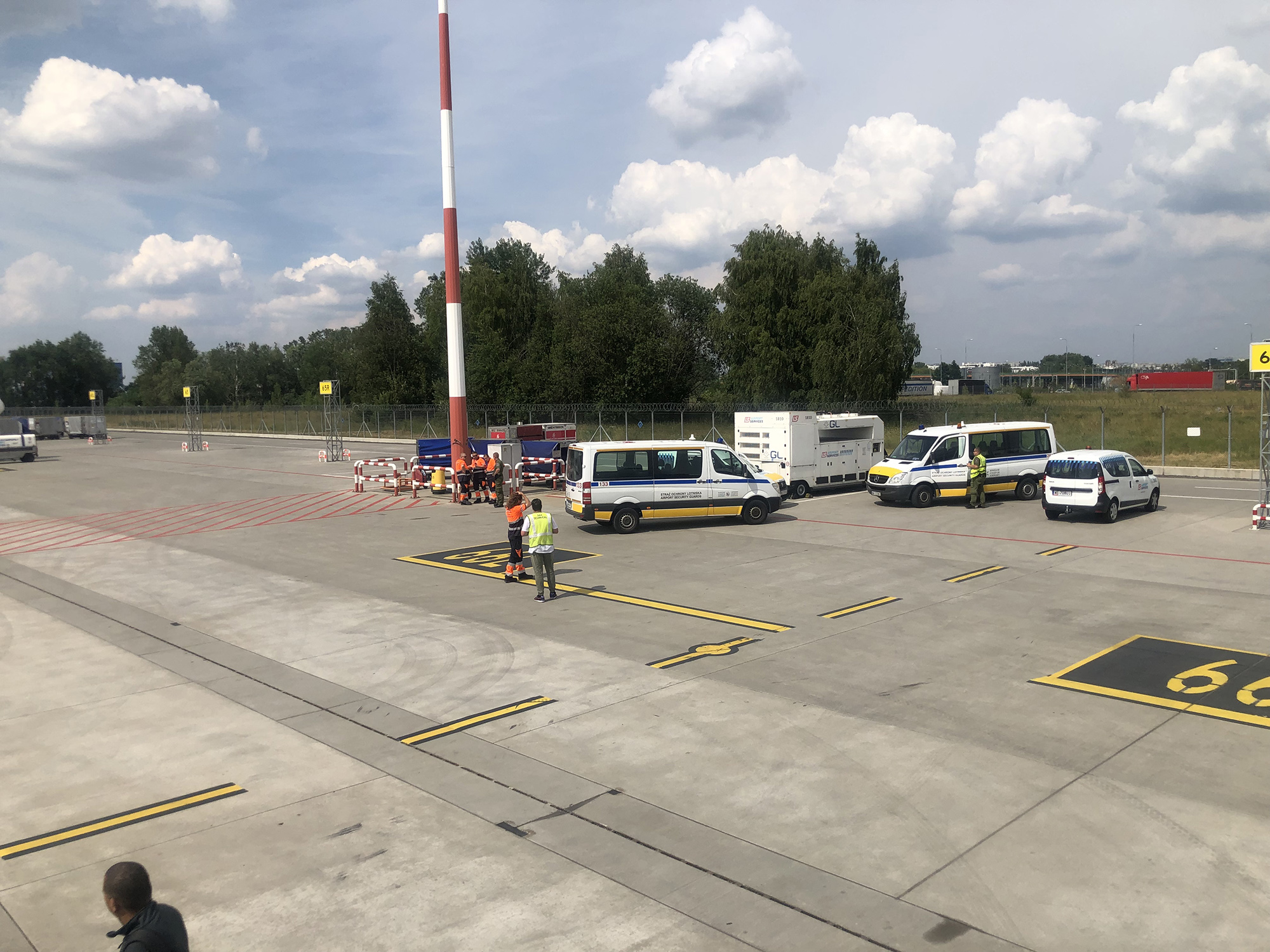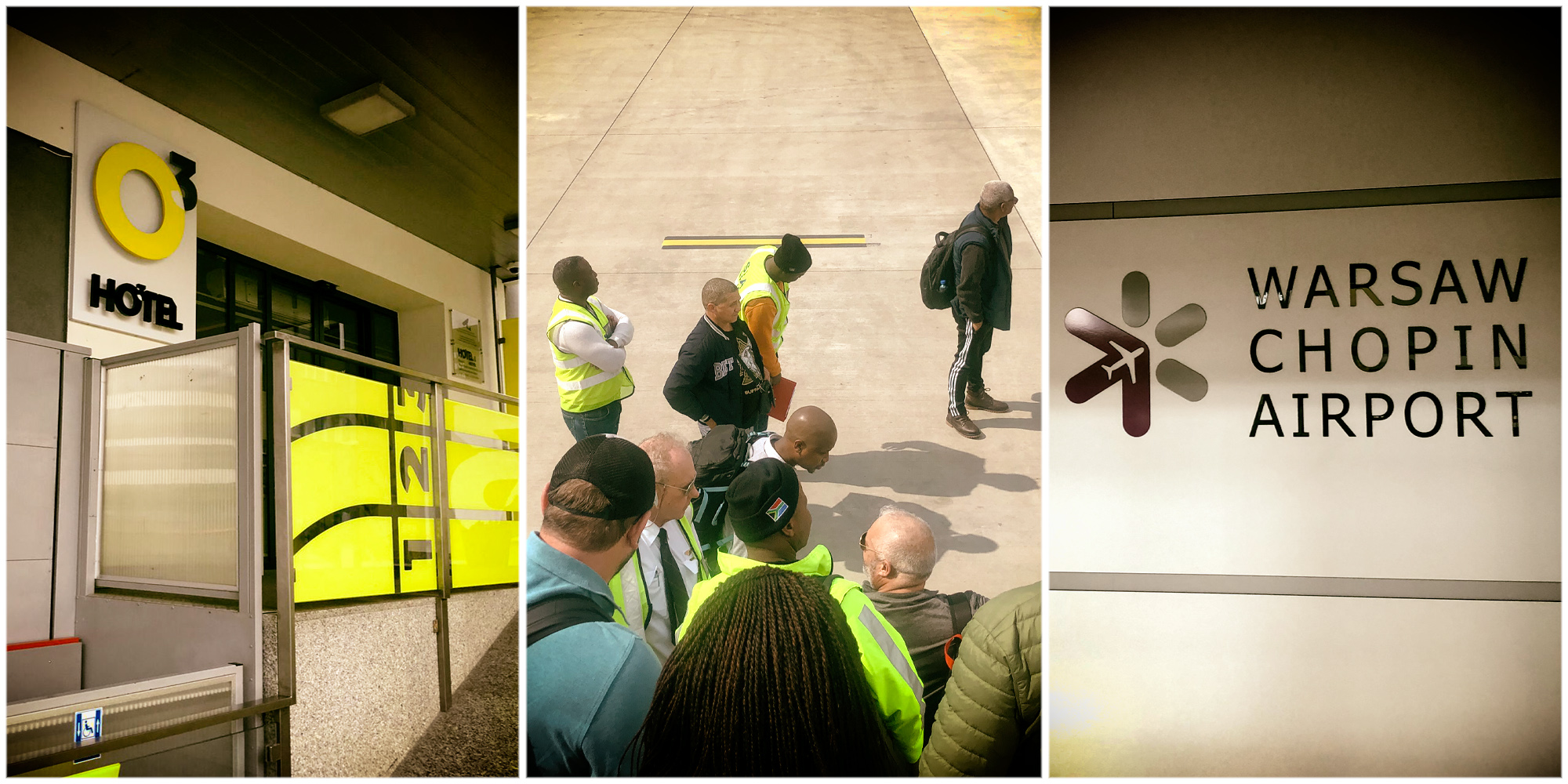It was on 31 May when the Presidency extended a media invitation to cover the African peace mission which would begin in Kyiv, Ukraine, and end in St Petersburg, Russia. It would be the first time I was covering a story of this magnitude in a conflict zone.
The Presidency began making travel arrangements for the 11 journalists flying with President Cyril Ramaphosa’s security personnel, who were to join him in Kyiv and St Petersburg.
Media houses would then pay other costs, including lodging and food, totalling over R30,000. The media had limited time to apply for visas and the Presidency assisted with fast-tracking the process, which could have taken weeks without its intervention.
This trip was the first in which journalists would travel with the President’s security detail and would be a litmus test to see if it would be a viable option in future.
Alarm bells
When it was time to travel, cracks began emerging in the planning of the mission. The initial departure date was Sunday, 3 June, but was later moved to Monday, 12 June. Then journalists were told that the departure would only be the next day. Several postponements later, departure was scheduled for Wednesday evening.
Captain of the SAA flight which was ferrying Ramaphosa’s security- Mpho Ramashele explains that they have met all the requirements to fly to Poland, but the issue is the mission. pic.twitter.com/eV42NZfUcP
— Queenin Masuabi (@Queenin_M) June 16, 2023
However, on Wednesday morning, while waiting to depart from the Waterkloof Air Force Base, an article in Business Day sounded alarm bells about the mission.
 Journalists leave the Waterkloof Air Force Base to cover the African peace mission in Ukraine and Russia. (Photo: Queenin Masuabi)
Journalists leave the Waterkloof Air Force Base to cover the African peace mission in Ukraine and Russia. (Photo: Queenin Masuabi)
The story outlined the reasons for our delayed departure. It mentioned that there were cost and insurance exclusions for aircraft charter companies as Ukraine and Russia were considered high-risk countries.
Journalists remained determined to cover the mission. A South African Airways A340-313 passenger jet came to the rescue.
On our way to Poland, we hit the first snag when we had to await approval to fly through Italian airspace. Captain Mpho Mamashela circled above the Mediterranean Sea until the required permit was secured.
We finally landed in Warsaw, Poland, on Thursday with the understanding that a second chartered plane would take us to Rzeszow in Poland.
The chartered flight was nowhere to be found. Some journalists wondered if the government had been scammed.
We waited in the plane on the tarmac for a few hours after being told that SAA was trying to get a permit to fly us to Rzeszow and then on to Russia. When it finally received permission, the issue of the weapons came into play. In the hold were at least 12 containers of weapons and other security equipment.
A statement from
the Polish government on the detention of an aircraft with members of South African President Cyril Ramaphosa’s security team at Warsaw Chopin Airport. pic.twitter.com/nMg43MFuXM
— Queenin Masuabi (@Queenin_M) June 16, 2023
In the meantime, Ramaphosa landed at Warsaw’s Chopin Airport. We thought we would be given an opportunity to hold an impromptu briefing with the President. However, we simply looked at the Inkwazi presidential jet from a distance in the stuffy SAA plane. Doors were eventually opened to allow fresh air in.
Read more in Daily Maverick: Mission impossible? SAA plane remains grounded following initial premature Polish clearance for take-off
That evening, frustrated Presidential Protection Services head Major-General Wally Rhoode called the media to the plane’s stairs to let us in on what was happening.
It was 10 hours since landing. Polish officials had said the security contingent did not have permits to disembark with the weapons or to move them beyond the airport. Instead, they wanted to confiscate the weapons.
Rhoode accused Polish officials of racism and of “jeopardising” the safety of the President by not allowing them to offload their equipment and weapons.
JUST IN: Presidential Protection Unit Head Wally Rhoode explains why a significant amount of Ramaphosa’s security team has been left stranded for more than 10 hours at the Warsaw airport. They were supposed to provide protection for the president during the Africa Peace Mission. pic.twitter.com/lc0foulbii
— Queenin Masuabi (@Queenin_M) June 15, 2023
With some information to file, journalists finally felt useful after not being able to submit stories all day. However, the reality of being stuck on the plane began to sink in.
It became even worse after hearing one of the security officers say, “This is a hostage situation, but in a nice way.”
‘Fetch Your Life’
A member of the presidential security unit, who had already been on the ground, tried to assist journalists that evening but she was strip-searched by Polish officials despite being in possession of a diplomatic passport.
When she arrived at the cargo section of Chopin Airport, where we had been waiting, she appeared visibly shaken, but ready to make sure that all women journalists could disembark and be taken to a hotel. Officials still did not allow this.
This meant that around 120 security personnel and 11 journalists had to spend the night in the aircraft.
Plane seats became makeshift beds and the tiny cabin bathrooms were the only place for passengers to freshen up.
The plane’s captain allowed music to be played while we waited, and the sounds of Mgwarimbe’s Sister Betina, Msaki’s Fetch Your Life and Kurt Darren’s Loslappie wafted through the fuselage.
Trying to lighten the mood, captain Mamashela said: “We could be breaking a record. I think that someone should make a note of it and put it in the Guinness Book of World Records. The situation of the aircraft is not a problem… everything that was supposed to be done has been done. The whole issue is about the mission and it is beyond me.
“My mission is to get the aircraft here safely and, as long as you are onboard, we will give you SAA hospitality.”
Mamashela and his crew did an outstanding job of making sure that all on board were provided with food and drinks, though supplies were running out.
Read more in Daily Maverick: Standoff at Warsaw airport after officials try to confiscate weapons from Ramaphosa’s Presidential Protection Unit
I struggled to get up in the morning on Friday and I was feeling down. An SAA cabin crew member, Ignatious Mahudya, came to speak to me but I downplayed how scared I was of the prospect of being held up at the airport for much longer.
Meanwhile, Ramaphosa and his team continued with the mission on Friday, minus a significant number of his security personnel.
The Presidency issued no statement to inform editors, family and friends of what had transpired, and there was no sign of concern for the plight of those on the grounded flight. This apparent lack of interest continued for the duration of the trip.
Black in Poland
At some point, journalists were informed that they would be disembarking, but as we were waiting on the stairs, the buses meant to fetch us drove away. This resulted in a verbal altercation between South African and Polish officials.
The South African officials had grown tired of “playing nice” and had decided that we should not allow the plane to become our bedroom for a second night.
Rhoode and his team told us to disembark and wait on the tarmac. This forced the Polish officials to call the buses back. On leaving the plane, we were prohibited from taking any hand luggage, which meant having to buy toiletries and a change of clothing.
Home at last, free at last ????
— Queenin Masuabi (@Queenin_M) June 18, 2023
We were stuck in Poland for two nights following the peace mission online, much like our colleagues back in SA. The government had been trying to at least get us to Russia, but was unable to secure clearance to travel through Hungarian airspace.
During my time in Poland, I had never felt so black in my entire life.
 The cars of Polish officials parked at the Chopin Airport tarmac where journalists and Presidential Protection Services members were left stranded. (Photo: Queenin Masuabi)
The cars of Polish officials parked at the Chopin Airport tarmac where journalists and Presidential Protection Services members were left stranded. (Photo: Queenin Masuabi)
Everywhere I went, I was met by curious stares from white Polish citizens. However, the few black people I saw on the streets all smiled or greeted me, as if they knew how I felt.
It then dawned on me why Rhoode felt like he had experienced racism from a Polish official, and why the black female presidential unit member was stripped and searched.
Read more in Daily Maverick: Response to grounding of African Peace Mission plane reveals very selective outrage
It became even more clear when I was swabbed for drugs at the airport before departing from Poland and heading back to South Africa. The journalists in front of me, and the security personnel who went to customs just after me, were not swabbed. The men behind me even asked if I was okay, after seeing what had happened.
My enforced stay in Poland made me appreciate South Africa, despite all its flaws.
There were behaviours I witnessed which would never be allowed in South Africa. For instance, a restaurant allows patrons to buy drinks before closing, then tells them they have to finish up and leave within 10 minutes.
Waiters would switch off the lights and tell us that they were about to close, while we were still eating.
We just checked into a hotel in Warsaw, all is well. I am praying that we won’t have any issues moving forward. Thank you for all the messages of support❤️
— Queenin Masuabi (@Queenin_M) June 16, 2023
Collateral damage
South Africa’s diplomatic ties need to be thoroughly assessed because it felt like there was more at play than just racism, missing permits or poor planning by South Africa.
Read more in Daily Maverick: Ask us anything about… the African Peace Mission to Ukraine and Russia
It might be that journalists were collateral damage in a diplomatic row which has arisen because of South Africa’s “non-aligned” stance on the Russia-Ukraine conflict. While Pretoria maintains it is neutral in the conflict, it is perceived by the West as being pro-Russia, which has compromised South Africa’s position with the US. The US and Poland are longtime allies with strong bilateral ties and the Polish government has been a supporter of a continued American military and economic presence in Europe.
There were a number of factors at play, but it felt as if the Poles were attempting to prevent another Lady R situation in the belief that SA was trying to deliver weapons to Russia. DM




 The cars of Polish officials parked at the Chopin Airport tarmac where journalists and Presidential Protection Services members were left stranded. (Photo: Queenin Masuabi)
The cars of Polish officials parked at the Chopin Airport tarmac where journalists and Presidential Protection Services members were left stranded. (Photo: Queenin Masuabi) 